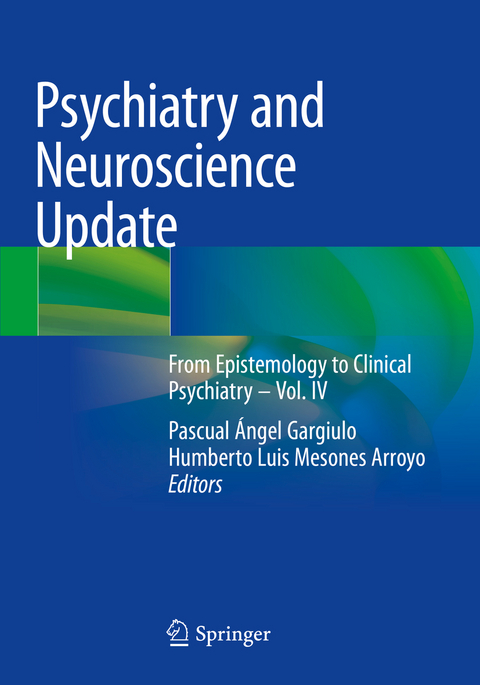
Psychiatry and Neuroscience Update
Springer International Publishing (Verlag)
978-3-030-61723-3 (ISBN)
This broad and thought-provoking volume provides an overview of recent intellectual and scientific advances that intersect psychiatry and neuroscience, offering a wide range of penetrating insights in both disciplines. The fourth volume on the topic in the last several years from a varying panel of international experts identifies the borders, trends and implications in both fields today and goes beyond that into related disciplines to seek out connections and influences. Similar to its three Update book predecessors, Psychiatry and Neuroscience - Volume IV presents a range of interesting topics in the main disciplines - psychiatry and neuroscience - and attempts to provide deeper comprehension or explication of the normal and diseased human mind, its biological correlates and its biographical and existential implications. This engaging volume continues the previous style of exploring different disciplines and trying to integrate disciplinary evidence from varying points of view in an organic manner.
The first section is about epistemological considerations regarding the study of normal and abnormal human behaviors, including, for example, the topic of phenomenological psychopathology and phenomenological psychiatry in relation to schizophrenia and substance misuse, among other topics.
Section 2 addresses issues around the translation of basic neuroscience to expression in the human brain and behavioral implications. Section 3 discusses the issues of learning, teaching and the role of social environment in the field of neuroscience. Finally section 4 reviews various perspectives on explaining human pathological behaviors -- from brain disorders to psychopathology.
lt;br>
Pascual Ángel Gargiulo, MD, PhD
Cathedra of Psychopathology
Catholic University of Argentina
Mendoza. Argentina
Laboratory of Neurosciences and Experimental Psychology
Area of Pharmacology
Department of PathologyFOREWORD
PREFACE
SECTION 1. EPISTEMOLOGICAL CONSIDERATIONS ABOUT THE STUDY OF NORMAL AND ABNORMAL HUMAN BEHAVIORS
1. Psychiatry and the Inference to the Best Explanation
2. The Notion of Empathy According to Edith Stein
3. Coincidence with One's Self
4. Naturalism, Psychology and Culture: Nature vs. Nurture?
5. The Self-Organized Feedback Brain
6. The Dynamis as the Object of a Philosophical Medicine. An Epistemological Analysis of the Treaty "On Ancient Medicine"
7. Inserted Thoughts and the Higher-Order Thought Theory of Consciousness.
8. Relationship between Body and Soul According to Saint Thomas: An Obsolete Issue?
9. The Conception of Psychosomatic Medicine in Spain: From Neurology to the Person
10. From Phenomenological Psychopathology to Phenomenological Psychiatry: The Cases of Schizophrenia and Substance Misuse
11. The Notion of Person in Neuroscience: From Cognitivism to a Comprehensive Phenomenology
12. The Neuroethics of Beauty: Insights from Aldous Huxley's Theory of Knowledge
13. Radical Solutions to the Ontological and Epistemological Problems of Consciousness
14. A Discussion of Anxiety over the Last Millennium (1000 to 2000)
SECTION 2: FROM BASIC NEUROSCIENCES TO HUMAN BRAIN
15. Neurotransmitters and Hormones in Human Decision-Making
16. Glial Cells in the Schizophrenia Puzzle: Angiotensin II Role
17. Somatostatin and Neurotensin Systems in Schizophrenia
18. Mechanisms of Action of Anxiolytics
19. From Benzodiazepine Prescription to Dependence: Learning Processes Involved
20. Beyond Acute Traumatic Brain Injury: Molecular Implications of Associated Neuro-inflammation in Higher-Order Cognitive Processes
21. Physiology and Pharmacology of Melatonin
22. Cytoprotection by Melatonin. The Metabolic Syndrome as an Example
23. Neural-Network Simulations of a Possible Role of the Hippocampus in Pavlovian Conditioning
24. Brassica Vegetables: Rich Sources of Neuroprotective Compounds
25. Colored Compounds in Fruits and Vegetables and Health
26. Prospects of Herbal Remedies in Neuropsychiatric Diseases from the Gut-Brain Communication Perspective
27. Biological Strategies, Adjunct to the Current Antidepressant Treatment
28. Potential Interactions between Environmental and Psychoneurobiological Factors in the Interface between Stress and Depression: A Road Map to Resilience
29. The Impact of Apolipoprotein E allelic Variants on Alzheimer Disease
30. Fearing Parkinson's Disease: Relationships between Cognition and Emotion
SECTION 3: NEUROSCIENCES, LEARNING, TEACHING AND THE ROLE OF SOCIAL ENVIRONMENT
31. Friendship Relationships in Children and Adolescents. Positive Development and Prevention of Mental Health Problems
32. Bullying and Cyberbullying in Adolescents: A Meta-analysis on the Effectiveness of Interventions
33. A Summary of the Developmental Trajectory of Executive Functions from Birth to Adulthood
34. Approach to Learning in the University: Reference to Learning to Learn
35. Comparative Cohort Study of Burnout Syndrome in State Schools' Teachers
36. Traumatic Situations and Mental Disorders in Migrants, Refugees and Asylum Seekers
SECTION 4: EXPLAINING HUMAN PATHOLOGICAL BEHAVIORS. FROM BRAIN DISORDERS TO PSYCHOPATHOLOGY.
37. The Transition to a Dimensional System for Personality Disorders: Main Advances and Limitations
38. Epilepsy and psychiatric comorbidities: new approaches and perspectives
39. Integrative Objective Quantification of Individual Locomotor Behavior in Depressive Patients: Implications for their Stratification and Personalized Treatment Monitoring
40. Epidemiological Perspectives in Psychosomatic and Liaison Psychiatry
41. Emotions and Cognitions in Bipolar Disorder
42. Cannabis and Psychosis: A Causal Association
43. Gut Microbiota Biomarkers in Autism Spectrum Disorders
44. Brain Magnetic Resonance Imaging in Attention-Deficit/Hyperactivity Disorder (ADHD)
45. Research Contributions of Magnetic Resonance Spectroscopy in Psychopathology
46. Prescribe Psychotropic Drugs in the Elderly
| Erscheinungsdatum | 25.01.2022 |
|---|---|
| Zusatzinfo | XXXV, 677 p. 83 illus., 50 illus. in color. |
| Verlagsort | Cham |
| Sprache | englisch |
| Maße | 178 x 254 mm |
| Gewicht | 1340 g |
| Themenwelt | Medizin / Pharmazie ► Medizinische Fachgebiete ► Psychiatrie / Psychotherapie |
| Schlagworte | Biology • Epistemology • Neurology • Neuroscience • Pathology • Psychiatry |
| ISBN-10 | 3-030-61723-8 / 3030617238 |
| ISBN-13 | 978-3-030-61723-3 / 9783030617233 |
| Zustand | Neuware |
| Haben Sie eine Frage zum Produkt? |
aus dem Bereich


